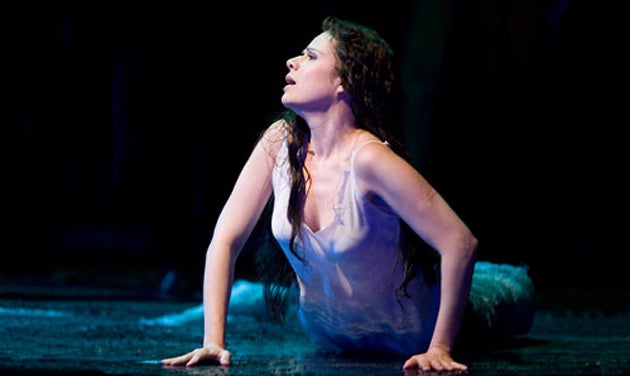Dvorak Rusalka, Glyndebourne Festival Opera, East Sussex

Your support helps us to tell the story
From reproductive rights to climate change to Big Tech, The Independent is on the ground when the story is developing. Whether it's investigating the financials of Elon Musk's pro-Trump PAC or producing our latest documentary, 'The A Word', which shines a light on the American women fighting for reproductive rights, we know how important it is to parse out the facts from the messaging.
At such a critical moment in US history, we need reporters on the ground. Your donation allows us to keep sending journalists to speak to both sides of the story.
The Independent is trusted by Americans across the entire political spectrum. And unlike many other quality news outlets, we choose not to lock Americans out of our reporting and analysis with paywalls. We believe quality journalism should be available to everyone, paid for by those who can afford it.
Your support makes all the difference.It helps to have a masterpiece as your starting point – and Dvorak’s Rusalka is certainly that – but when you’ve a director as painfully honest and unpretentious as Melly Still and a conductor, in Jiri Belohlavek, whose intent is not merely to conduct the piece but to honour it as a treasured part of his heritage, then we’re talking a very special alchemy around what we hear, see, and feel.
Still and her designer Rae Smith have truly sought to enter the dappled sound world of this wonderful score and what they give us is very much what Belohlavek will have grown up with – albeit a more sophisticated take on the opera’s fairy tale environment, one which still retains the earthy (or watery) woodcut-like feel of its folksy raw materials.
Dancers are used to spirit the singers into their water borne state; poetic lifts magically ferry them between forest and lake. Even as the prelude to the opera unfolds we see the Prince hurl himself into the murky waters and in a premonition of his destiny become ensnared by one of the water sprites, her tail acting like some kind of malicious tentacle. In returning Rusalka to the “Little Mermaid” origins of Hans Christian Andersen Still is able to pick up on one or two feminist home truths: this Rusalka desires to be a whole woman but her mermaid’s tail effectively “binds” her, keeps her in her place, and when she does at last “find her feet” she is robbed of her freedom of speech. Such is the terrible price of womanhood.
Then, in a neat twist, her enabler – the witch Jezibaba (played in a real casting coup by the indomitable Larissa Diadkova) – is some kind of malevolent big-skirted babushka with a head-scarf and a hunting knife. And there’s no escaping her – she’s everywhere, replicated around the stage by shadowy clones mirroring her every gesture. It’s like Still is saying that Rusalka is the victim of tradition. How ironical, too, that the bloody sacrificial ritual (someone really should call the RSPCA) should be enacted to music of Dvorak at his most innocuously folksy.
So a grim reality lies at the heart of this particular fairy tale and shouldering so much of its burden it is the wonderful Rusalka of Ana Maria Martinez. What a special performance this is. Martinez does not immediately reveal what might be considered the classic Rusalka voice but she sings from such a deep core of longing, intensified by the courage of her conviction in the big releases and softened by the benevolence of melting portamento in the many moments of fragility that you totally buy into the belief that she can sing just about anything.
Equally remarkable is the long stretch of act two where she doesn’t sing at all (how daring of Dvorak to silence his leading lady at the very centre of the drama). How movingly she conveys this lost child of nature marooned centre-stage on her wedding day as handmaidens apply the unwelcome “feminine” touches. And all the while the consoling voice of her father Vodnik (the outstanding Mischa Schelomianski) is calling her home.
You’d have to be made of stone not to shed a tear or two at the final parting of Martinez and her Prince Charming (Brandon Jovanovich, he of the square jaw and most of the heroic money notes). But Melly Still finds a glimmer of light in the eternal darkness. Rusalka has known true love. She is a whole woman at last.
Join our commenting forum
Join thought-provoking conversations, follow other Independent readers and see their replies
Comments